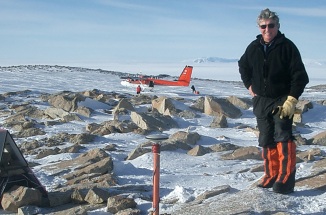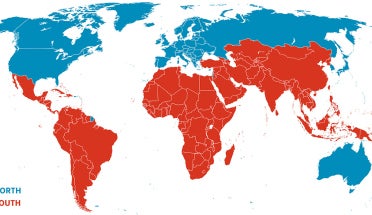
Longhorn Geologist Receives Top U.K. Award for Polar Exploration
- Jun 29, 2023
[Editor's Note: This story is part of a Texas Global series celebrating UT Austin faculty members whose work has received international honors or awards.]
Ian Dalziel, senior research scientist at The University of Texas at Austin, has been honored with the Polar Medal — the United Kingdom’s top award for polar exploration.
The medal recognizes Dalziel’s contributions to Antarctic geology, including discoveries about the icy continent’s ancient past and the fragility of its ice sheet today. The award will be presented by King Charles III at Buckingham Palace later in 2023.
“This medal is about more than just Ian’s status as an exceptional scientist. It’s about the spirit of exploration that Ian imprinted on the scientific community and the institute where he has worked for over 35 years,” said Demian Saffer, director of the UT Institute for Geophysics.
Dalziel, who is a professor in the Department of Geological Sciences, was born in Scotland and holds dual citizenship in the United States and United Kingdom. He has led numerous important international research efforts in Antarctica with scientists of the British Antarctic Survey.
His seminal expedition to explore the “doomsday” Thwaites Glacier set off a subsequent wave of scientific research into Earth’s past supercontinents. He also made a groundbreaking investigation of South Georgia, a remote sub-Antarctic island, which revealed that it is, in fact, a lost fragment of the southern Andes in South America.
Dalziel’s scientific endeavors have changed the way Antarctica is studied. He established the first GPS receiver network across West Antarctica, which led to the discovery that the continent is rapidly rising as its ice sheet melts away. The network is now part of a global network for observing the polar regions.
Early recipients of the Polar Medal, which has existed for more than 150 years, include pioneers of polar exploration Capt. R.F. Scott and Sir Ernest Shackleton, who made the first attempt to reach the South Pole in 1902. Dalziel’s medal comes just two years after he received the Geological Society of America’s Penrose Medal, widely considered to be the world’s most prestigious career award in geology.
“Like many British kids, I’d grown up on a diet of Scott, Shackleton and (Edmund) Hillary, and was intrigued by Antarctica and the Scotia Arc,” Dalziel said. “But (pioneering geologist) Arthur Holmes and the way he looked at the world inspired me to look over the horizon and make connections that other people hadn’t made.”



